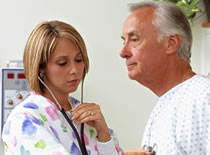2009 H1N1 and Seasonal Flu: Interim Guidance for Adults with Cardiovascular Disease*

January 26, 2010 3:00 PM ET
*This update provides new information regarding vaccination guidelines for 2009 H1N1 flu and seasonal flu for persons with chronic cardiovascular diseases.
The 2009-2010 flu season is upon us and many people are likely to get ill with either the usual seasonal flu or 2009 H1N1 flu. People with heart disease, cardiovascular disease, or who have had a stroke are at increased risk of having medical complications of flu. The information in this document is intended to help this group prevent getting seasonal and 2009 H1N1 flu and provide guidance if they develop flu-like symptoms.
2009 H1N1 Flu (Formerly Called “Swine Flu”) and Seasonal Flu: General Information
The information below is important for people with cardiovascular disease.*
- Maintain a 2-week supply of your regular medications.
- Do not stop taking your regular medications without first consulting your health care provider, especially if you get the flu or a respiratory infection.
- People with heart failure should be alert to changes in their breathing and should promptly report changes to their health care provider.
- It is especially important to wash your hands often with soap and water and follow other everyday hygienic actions to prevent the spread of germs that cause respiratory illnesses like the flu.
- If you have symptoms of the flu (i.e., fever, cough, sore throat, runny or stuffy nose, body aches, headache, chills and fatigue) and you have heart disease, stroke, or cardiovascular disease, promptly contact your health care provider to see if you need antiviral medication. Influenza antiviral medications can reduce the severity and duration of influenza illness and can reduce the risk of influenza-related complications. Information on antiviral medication recommendations is available at "Updated Interim Recommendations for the Use of Antiviral Medications in the Treatment and Prevention of Influenza for the 2009-2010 Season".
*Cardiovascular disease includes but is not limited to heart failure, angina, peripheral vascular disease, atrial fibrillation or other heart rhythm abnormalities, stroke, and heart attack, and adults with congenital heart disease.
Influenza Vaccine Guidance for Adults
If you have a history of heart disease, stroke, or other cardiovascular diseases, then you are at increased risk of serious flu-related complications and should be vaccinated with the seasonal flu shot as well as the 2009 H1N1 flu shot this season. Supplies of the vaccine against 2009 H1N1 are ample, and CDC is now encouraging everyone to get vaccinated, including people 65 years and older.
For More Information:
- For general information on 2009 H1N1 flu
- For information on 2009 H1N1 vaccine
- For information on seasonal flu
- Hand Washing Guide
Get email updates
To receive weekly email updates about this site, enter your email address:
Contact Us:
- Centers for Disease Control and Prevention
1600 Clifton Rd
Atlanta, GA 30333 - 800-CDC-INFO
(800-232-4636)
TTY: (888) 232-6348 - Contact CDC-INFO
